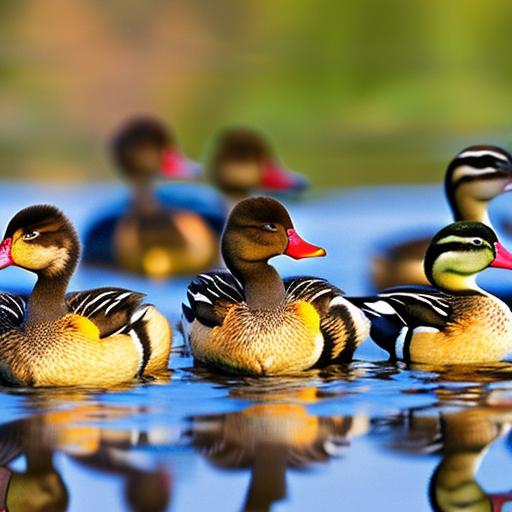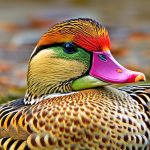Ducks have been domesticated for thousands of years, with evidence of their presence dating back to ancient Egypt and China. These waterfowl were initially kept for their meat, eggs, and feathers, but over time, they have also become popular as pets. While most people are familiar with large duck breeds like the Pekin or Muscovy, there are also smaller breeds that make excellent companions. Small pet duck breeds are gaining popularity due to their unique characteristics and low maintenance requirements.
Small pet duck breeds are typically smaller in size compared to their larger counterparts. They are bred specifically for their small stature, making them suitable for those who have limited space or prefer a smaller pet. These ducks are often kept as pets rather than for commercial purposes. They come in a variety of colors and patterns, making them visually appealing. Some popular small pet duck breeds include Call ducks, Bantam ducks, and Miniature Appleyard ducks.
Key Takeaways
- Small pet duck breeds are becoming increasingly popular as pets.
- Owning a small pet duck can provide companionship and entertainment.
- Small pet ducks are generally friendly and easy to care for.
- Popular small pet duck breeds include the Call Duck, the Miniature Appleyard, and the Silver Bantam.
- Caring for small pet ducks involves providing proper housing, feeding, and health care.
Benefits of Owning a Small Pet Duck
Owning a small pet duck can bring many benefits to your life. Firstly, they provide companionship and entertainment. Ducks are social animals and enjoy being around humans and other animals. They can form strong bonds with their owners and often enjoy being petted and cuddled. Watching them waddle around and interact with their environment can be highly entertaining.
Another advantage of small pet ducks is that they are low maintenance pets. They require less space compared to larger breeds and can be easily accommodated in a backyard or even indoors with proper care. Ducks are generally hardy animals and do not require extensive grooming or regular veterinary visits.
Small pet ducks are also unique and interesting pets to have. Their quirky behaviors and adorable appearance make them stand out from more common pets like dogs or cats. They have a distinct personality and can develop individual traits that make them even more endearing.
Characteristics of Small Pet Duck Breeds
Small pet duck breeds have distinct characteristics that set them apart from larger breeds. Firstly, they are smaller in size and lighter in weight compared to their larger counterparts. This makes them easier to handle and care for, especially for those who may have physical limitations.
Feather colors and patterns can vary greatly among small pet duck breeds. Some may have solid colors like white or black, while others may have intricate patterns or markings. This adds to their visual appeal and makes them a popular choice for those who appreciate unique and beautiful animals.
In terms of temperament, small pet duck breeds are generally friendly and sociable. They enjoy human interaction and can become quite attached to their owners. They are also known to get along well with other pets, making them a great addition to multi-pet households.
Popular Small Pet Duck Breeds
There are several small pet duck breeds that are popular among duck enthusiasts. One such breed is the Call duck. Call ducks are known for their small size and distinctive quack, which is higher-pitched compared to other ducks. They come in a variety of colors and patterns, including solid colors like white, gray, or black, as well as patterns like pied or mallard.
Bantam ducks are another popular small pet duck breed. They are a miniature version of larger duck breeds and come in various colors and patterns. Bantam ducks are known for their friendly and sociable nature, making them great companions.
Miniature Appleyard ducks are also a popular choice for those looking for small pet ducks. They are a smaller version of the traditional Appleyard breed and have similar characteristics, including their striking feather colors and patterns.
Caring for Small Pet Ducks
Caring for small pet ducks requires a daily care routine to ensure their health and well-being. This includes providing them with fresh water and food, cleaning their living space, and monitoring their overall health.
Ducks require access to clean water at all times for drinking and bathing. They should have a shallow dish or pool that allows them to submerge their heads and bodies. It is important to regularly clean and refill their water source to prevent the growth of bacteria.
Feeding small pet ducks a balanced diet is crucial for their health. They should be provided with a commercial duck feed that is specifically formulated for their nutritional needs. This should be supplemented with fresh fruits and vegetables, as well as occasional treats like mealworms or cracked corn.
Exercise and playtime are also important for small pet ducks. They should have access to a safe and secure outdoor area where they can roam and explore. Ducks are natural foragers, so providing them with opportunities to search for insects or plants can help keep them mentally stimulated.
Feeding Small Pet Ducks

Feeding small pet ducks a proper diet is essential for their overall health and well-being. Ducks are omnivores and require a balanced diet that includes both plant matter and protein sources.
A commercial duck feed is the foundation of a duck’s diet. This feed is specifically formulated to meet the nutritional needs of ducks and should make up the majority of their daily intake. It is important to choose a high-quality feed that is appropriate for the age and breed of your duck.
In addition to commercial feed, small pet ducks can also be given fresh fruits and vegetables as part of their diet. Leafy greens like spinach or kale, as well as fruits like berries or melons, can be offered as treats or added to their regular feed. It is important to introduce new foods gradually to avoid digestive upset.
Treats and snacks can also be given to small pet ducks in moderation. Mealworms, cracked corn, or peas are popular choices for duck treats. These should be given sparingly and not exceed more than 10% of their daily diet.
Water is also an important component of a duck’s diet. Ducks require access to clean, fresh water at all times for drinking and bathing. They should have a shallow dish or pool that allows them to submerge their heads and bodies. It is important to regularly clean and refill their water source to prevent the growth of bacteria.
Housing Small Pet Ducks
Housing small pet ducks requires careful consideration of their needs and safety. Ducks can be kept both indoors and outdoors, depending on the owner’s preference and available space.
Indoor living arrangements for ducks typically involve a large enclosure or pen that provides enough space for them to move around comfortably. The enclosure should be lined with bedding material like straw or wood shavings to provide insulation and absorb moisture. It should also have a secure door or gate to prevent escape.
Outdoor living arrangements for ducks often involve a coop or shed that provides shelter from the elements. The coop should be well-ventilated and predator-proof, with secure fencing around the perimeter. Ducks should have access to a safe outdoor area where they can roam and forage.
Bedding materials should be provided in both indoor and outdoor housing to keep ducks comfortable and maintain cleanliness. Straw or wood shavings are commonly used as bedding material, as they provide insulation and absorb moisture.
Health Concerns for Small Pet Ducks
Like any other pet, small pet ducks are susceptible to certain health issues. It is important for owners to be aware of common health concerns and take preventative measures to keep their ducks healthy.
One common health issue in small pet ducks is respiratory infections. Ducks can develop respiratory infections due to poor ventilation, damp bedding, or exposure to drafts. Symptoms may include coughing, sneezing, nasal discharge, or difficulty breathing. Providing a clean and well-ventilated living environment can help prevent respiratory infections.
Another health concern in small pet ducks is parasites. External parasites like mites or lice can infest a duck’s feathers and skin, causing irritation and discomfort. Regular grooming and inspection of the duck’s feathers can help detect and treat parasites early.
Ducks are also prone to certain viral and bacterial infections, such as duck viral enteritis or botulism. Vaccinations are available for some of these diseases and can be administered by a veterinarian. It is important to consult with a veterinarian to develop a vaccination schedule and discuss preventative measures.
If a small pet duck shows signs of illness or injury, it is important to seek veterinary care. Ducks are adept at hiding signs of illness, so any changes in behavior or appearance should be taken seriously. A veterinarian with experience in avian medicine can provide the necessary care and treatment for small pet ducks.
Training Small Pet Ducks
Training small pet ducks can be a rewarding experience for both the owner and the duck. Ducks are intelligent animals and can learn basic commands and behaviors with consistent training.
Basic training techniques for ducks involve positive reinforcement and repetition. Ducks respond well to treats and praise, so rewarding them for desired behaviors can help reinforce those behaviors. Training sessions should be short and frequent to keep the duck engaged and focused.
Potty training can also be taught to small pet ducks. Ducks naturally have a tendency to eliminate in water, so providing them with a shallow dish or pool for bathroom breaks can help keep their living area clean. It is important to gradually introduce the concept of potty training and be patient with the duck’s progress.
Socialization with other pets and humans is also an important aspect of training for small pet ducks. Ducks can be introduced to other pets in a controlled environment, allowing them to become familiar with each other’s presence. They can also be socialized with humans through regular handling and interaction.
Is a Small Pet Duck Right for You?
In conclusion, owning a small pet duck can bring many benefits and joys to your life. They provide companionship, entertainment, and are low maintenance pets. Small pet duck breeds have unique characteristics and come in a variety of colors and patterns. Popular small pet duck breeds include Call ducks, Bantam ducks, and Miniature Appleyard ducks.
Caring for small pet ducks involves a daily care routine, proper feeding, and providing them with a suitable living environment. Ducks require access to clean water at all times, a balanced diet, and regular exercise. Housing for small pet ducks can be indoors or outdoors, depending on the owner’s preference and available space.
Health concerns for small pet ducks include respiratory infections, parasites, and viral or bacterial infections. Preventative measures such as vaccinations and regular veterinary care can help keep ducks healthy. Training small pet ducks involves positive reinforcement and repetition, and they can be taught basic commands and behaviors.
Before adopting a small pet duck, it is important to consider the responsibilities and commitments involved. Ducks require time, space, and resources to thrive. Researching and learning more about small pet ducks can help potential owners make an informed decision. With proper care and attention, small pet ducks can bring joy and companionship to their owners for many years to come.
If you’re considering getting a small pet duck, it’s important to understand the breeding and mating season of ducks. Poultry Wizard has a helpful article on “When is Duck Mating Season?” that provides valuable information on the topic. Understanding the mating season can help you plan and prepare for breeding if you’re interested in expanding your flock. To learn more about this fascinating aspect of duck ownership, check out the article here. And while you’re at it, don’t forget to explore their other articles on keeping chickens and finding the perfect coop, such as their guide to creating a garden chicken coop (link) or their review of the Producers Pride Sentinel Chicken Coop (link). Happy reading and happy duck-keeping!
FAQs
What are small pet duck breeds?
Small pet duck breeds are domesticated ducks that are smaller in size compared to other duck breeds. They are usually kept as pets and are known for their friendly and docile nature.
What are some examples of small pet duck breeds?
Some examples of small pet duck breeds include Call ducks, Bantam ducks, Mandarin ducks, and Wood ducks.
What is the average size of small pet duck breeds?
Small pet duck breeds usually weigh between 1-3 pounds and are around 10-15 inches in length.
What is the lifespan of small pet duck breeds?
Small pet duck breeds can live up to 10-15 years with proper care and nutrition.
What kind of environment do small pet duck breeds need?
Small pet duck breeds need a clean and spacious environment with access to water for swimming and drinking. They also need a shelter to protect them from extreme weather conditions.
What do small pet duck breeds eat?
Small pet duck breeds eat a diet that consists of commercial duck feed, fresh vegetables, fruits, and insects. They also need access to clean water for drinking and swimming.
Can small pet duck breeds be kept indoors?
Small pet duck breeds can be kept indoors, but they need access to a water source for swimming and cleaning. It is important to provide them with a clean and spacious environment to prevent health issues.
Meet Walter, the feathered-friend fanatic of Florida! Nestled in the sunshine state, Walter struts through life with his feathered companions, clucking his way to happiness. With a coop that’s fancier than a five-star hotel, he’s the Don Juan of the chicken world. When he’s not teaching his hens to do the cha-cha, you’ll find him in a heated debate with his prized rooster, Sir Clucks-a-Lot. Walter’s poultry passion is no yolk; he’s the sunny-side-up guy you never knew you needed in your flock of friends!







